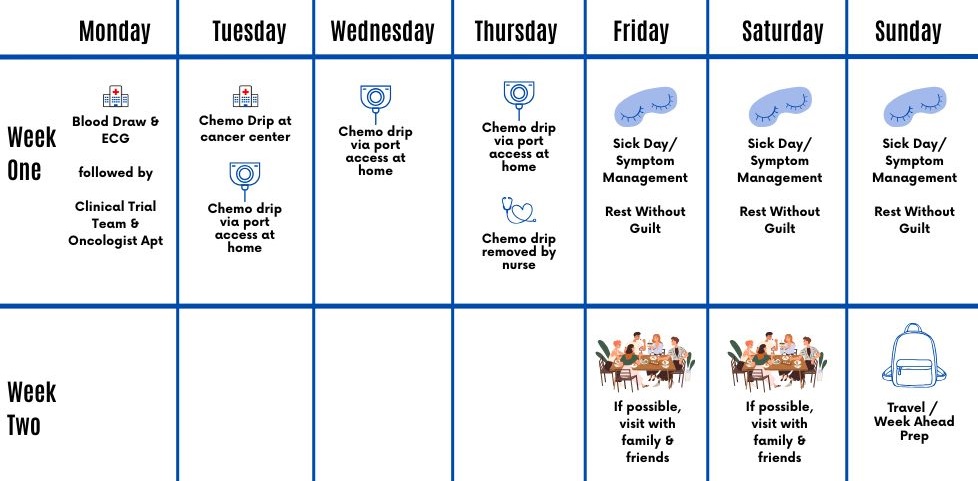Advocacy & Awareness
Dylan’s Chemotherapy Journey

This represents the two week cycle of Dylan's specific treatment plan on BOLD-100 & FOLFOX
This visual only displays the chemo cycle, not other medical appointments (symptom management, supplementary modalities, therapy, tests or scans)
Every two weeks, Dylan undergoes this intense schedule. From hospital infusions to home care and crash days, each phase brings its own challenges. It’s a full-time fight—with no real “days off.”
What is BOLD-100?
BOLD-100 is an investigational therapy currently in a Phase II clinical trial. It’s a ruthenium-based compound being studied for its potential to enhance the effectiveness of traditional chemotherapy by making cancer cells more vulnerable to treatment. In Dylan’s case, BOLD-100 is being used alongside FOLFOX as part of a global trial with only 120 patients worldwide. While it’s still being studied, BOLD-100 represents a new frontier in cancer research—and one he’s proud to be part of.
Why Medical Trials Matter
At Stage 4, traditional treatment options become limited. Medical trials, while uncertain, offer a chance. For us, it came down to this: we had nothing to lose—but maybe, just maybe, something to gain.
We believe in science. We believe in the constant evolution of cancer treatment. And for Dylan to participate in something that might one day lead to a breakthrough—or even a cure—means he is part of the fight in a monumental way.
And being in a trial at a world-renowned cancer and research center like Princess Margaret means Dylan has a LOT of eyes on him at all times—from oncologists to research teams and nurses who track every detail. That kind of attention brings us real comfort.
Life on FOLFOX
Dylan’s treatment regimen, known as FOLFOX, is a combination chemotherapy commonly used for advanced colorectal cancer. It includes three drugs:
Oxaliplatin
Oxaliplatin damages the DNA inside cancer cells, preventing them from replicating and eventually killing them.
Notable side effects: It’s the main culprit behind neuropathy—nerve damage that can cause tingling, numbness, or pain in the hands and feet. It may also cause cold sensitivity, fatigue, and nausea.
Leucovorin
Boosts the effectiveness of 5-FU by helping it bind better to its target inside cancer cells, enhancing the cancer-killing effect.
5-Fluorouracil (5-FU)
5-FU interferes with how cancer cells use nutrients to grow and copy themselves. It essentially starves the cancer cells of what they need to multiply.
Notable side effects: Mouth sores, diarrhea, low blood counts, nausea, and fatigue.
Managing Side Effects
To mitigate the side effects of chemotherapy, Dylan follows a rigorous pre-medication schedule.
Despite these precautions, Dylan experiences a range of side effects:
- Neuropathy: One of the more frightening side effects—neuropathy is nerve damage that can cause numbness, tingling, or burning in the hands and feet. It can impact daily tasks, grip strength, and even walking. In some cases, it becomes permanent. We closely monitor symptoms and adjust treatment if needed.
Nausea and vomiting: Common during and after treatment.
- Diarrhea: A common but exhausting side effect of chemotherapy, often worsened by certain drugs in the FOLFOX regimen. It can lead to dehydration and fatigue, and we manage it with hydration, diet adjustments, and medication.
Fatigue: A pervasive sense of exhaustion that can last several days post-treatment.
Mouth sores: Painful ulcers that make eating, drinking and speaking difficult.
Brain fog: Cognitive impairment affecting memory, attention, and executive function.
Understanding Colorectal Cancer
Colorectal cancer is the third most commonly diagnosed cancer in Canada and the second leading cause of cancer-related deaths. In 2024 alone, the Canadian Cancer Society estimates that 25,200 Canadians will be diagnosed with colorectal cancer, and 9,400 will lose their lives to it.
Despite advancements in treatment and screening efforts, colorectal cancer continues to pose a major health burden across the country—especially because it’s often detected too late.
Colorectal cancer typically begins as noncancerous growths (polyps) in the colon or rectum. These polyps can turn cancerous over time, often without any symptoms in the early stages. When caught early, colorectal cancer is highly treatable—with Stage I patients having a five-year survival rate of approximately 90%. But once the disease spreads, that number drops sharply. By Stage IV, the five-year survival rate plummets to under 15%.
Risk factors for colorectal cancer include being over 50, having a family history of colorectal cancer, inflammatory bowel disease (IBD), poor diet, smoking, heavy alcohol use, and lack of physical activity. However, CRC doesn’t discriminate by age as much as it once did. In fact, cancer rates in young adults are rising at alarming rates, while screening access, education, and clinical attention lag far behind.
Dylan’s story is tragically common. Despite a clear family history and repeated visits to doctors and emergency rooms, his concerns were overlooked.
Common CRC Symptoms:
Persistent changes in bowel habits (diarrhea, constipation, narrowing of stool)
Blood in the stool (visible or hidden)
Abdominal pain, cramping, or bloating
Unexplained fatigue or weakness
Weight loss with no clear cause
The problem? Many people don’t experience any symptoms until the disease is advanced.
That’s why proactive screening matters. For average-risk individuals in Canada, a fecal immunochemical test (FIT) is recommended every two years starting at age 50. But for anyone with a family history—or persistent, unexplained symptoms—screening should happen sooner. Colonoscopies remain the most comprehensive method for detection and prevention.
Early detection can mean the difference between life and death. It’s not an exaggeration—it’s fact.
Insist on a Colonoscopy
If you’re experiencing symptoms, have a family history of colorectal cancer, or just feel like something isn’t right—insist on a colonoscopy.
Dylan visited walk-in clinics, emergency rooms, and his family doctor multiple times with clear symptoms of colorectal cancer. Every time, he was dismissed. Told he was too young. Told it was acid reflux. Told to wait another 30 days, another 30 days, another 30 days.
By the time his cancer was caught, it had spread to his lungs and abdomen. He was 39 years old.
We don’t say this to scare you—we say it because his story is not unique. And it doesn’t have to be yours.
If your doctor brushes off your concerns or is reluctant to refer you for a colonoscopy, do not take no for an answer. You are your own best advocate. Keep pushing. Ask why. Ask again. And if you keep hitting walls, take it into your own hands:
Call your local cancer centre and ask about colorectal screening options. Many cancer centers across Canada offer screening programs or can point you toward the nearest location that does. We didn’t even know this was possible until it was too late. You shouldn’t have to find out the hard way.
What to Expect from a Colonoscopy:
It’s not as scary as it sounds.
Prep takes about a day. You’ll follow a clear-liquid diet and take a prescribed laxative to empty your bowels.
The procedure itself is relatively quick—about 45 minutes.
You’ll be sedated (aka, you’ll have an amazing nap through the whole thing).
You go home the same day and feel back to normal soon after.
And the best part? It could save your life.
Whether you’re worried about the test or feel like you’re being ignored, we’re here to help you navigate the noise and get the care you deserve.
If you have questions about Dylan’s colonoscopy or need a pep talk before yours: Email him
Want help finding the nearest cancer or screening center near you? Email Alexandria

Advocacy & Awareness
Expanding Screening Guidelines
Individuals born after 1980 are 2 to 2.5 times more likely to be diagnosed with colorectal cancer before age 50 compared to previous generations . Despite this trend, current screening programs primarily target those aged 50 to 74 .
We advocate for lowering the recommended screening age to 35, especially for individuals with risk factors such as family history. Early detection through screening can significantly improve outcomes, with a 90% five-year survival rate when colorectal cancer is caught at Stage I.
Raising Public Awareness
Awareness of colorectal cancer symptoms and risk factors remains low among younger populations. A survey revealed that 41.6% of respondents were unaware that colorectal cancer could occur in individuals under 50, and 45.2% were unfamiliar with its signs and symptoms.
We aim to educate the public about colorectal cancer symptoms, including:
Persistent changes in bowel habits
Rectal bleeding
Abdominal discomfort
Sudden and consistent acid reflux
Unexplained weight loss
Improving Healthcare Access
Access to primary healthcare is a significant concern in Canada. As of 2023, approximately 17% of Canadians do not have a regular healthcare provider . In Ontario alone, 2.5 million residents are without a family doctor. This is projected to double by 2026.
This lack of access can lead to delayed diagnoses and treatment. We advocate for systemic changes to ensure timely and equitable access to diagnostic services and primary care providers.
Advocating for Financial Support
A cancer diagnosis brings not only emotional and physical challenges but also significant financial burdens. On average, Canadian cancer patients face nearly $33,000 in out-of-pocket expenses during their treatment journey. Imagine how you would cover those costs when unable to work.
You can sign the Canadian Cancer Society’s petition to reduce the cost of cancer care in Canada here.
For families like ours, the costs are staggering. Dylan manages approximately 18 prescriptions, each with associated costs. Even with private insurance, co-pays add up quickly. While chemotherapy infusions are covered, many supportive medications and treatments are not.
We advocate for comprehensive financial support for families dealing with terminal illnesses, ensuring that no one has to choose between treatment and basic living expenses.
By sharing our story and advocating for these changes, we hope to make a difference for others facing similar battles.